My main research interests revolve around issues of international development, international migration, displacement, and diaspora policies, as well as international cooperation on these areas. I am particularly interested in the social and political nodes of domestic, international and transnational spheres and in the determinants and effects of state actions within and beyond traditional spaces of sovereignty.
My principal research projects revolve around the following themes:
My principal research projects revolve around the following themes:
- SDGs, global governance, interagency cooperation and human mobility
- Migration, Citizenship and Development
- Diaspora Investment
- Immigration Policies in the Global South
- Defining the boundaries of citizenship
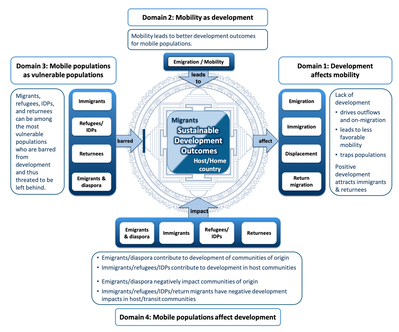
SDGs, global governance, interagency cooperation and human mobility
The Sustainable Development Goals (SDGs) include a number of explicit references to migration. This includes the necessity to protect migrant workers’ labour rights, promote safe and secure working environments, in particular for women migrants (target 8.8), facilitate orderly, safe, regular and responsible migration (target 10.7), and reduce the transaction costs of migrant remittances (target 10.c), as well as scholarships that can affect student mobility (target 4.b) and trafficking in persons, especially of women and children (targets 5.2, 8.7, 16.2). These mentions exemplify that migration and displacement have a prominent place in global development strategies. My research sheds lights on how these targets and their respective indicators are conceptualized and implemented.
In addition, I propose the mobility mandala (see the figure to the right), a comprehensive framework to systematize the various links between human mobility and the Sustainable Development Goals (SDGs). The mobility mandala conceptualizes four principal ways in which human mobility interacts with sustainable development. It incorporates all forms of mobility; provides a unified analytical lens for in-migration, out-migration, transit and return migration; and categorizes public policy and SDG interventions, supporting a more varied, more specific, and human-rights based understanding of migration governance. The proposed framework is not limited to the direct migration targets in the SDGs. According to the framework, all 17 SDGs and nearly all their 169 targets are linked to human mobility and often in multiple ways.
The Sustainable Development Goals (SDGs) include a number of explicit references to migration. This includes the necessity to protect migrant workers’ labour rights, promote safe and secure working environments, in particular for women migrants (target 8.8), facilitate orderly, safe, regular and responsible migration (target 10.7), and reduce the transaction costs of migrant remittances (target 10.c), as well as scholarships that can affect student mobility (target 4.b) and trafficking in persons, especially of women and children (targets 5.2, 8.7, 16.2). These mentions exemplify that migration and displacement have a prominent place in global development strategies. My research sheds lights on how these targets and their respective indicators are conceptualized and implemented.
In addition, I propose the mobility mandala (see the figure to the right), a comprehensive framework to systematize the various links between human mobility and the Sustainable Development Goals (SDGs). The mobility mandala conceptualizes four principal ways in which human mobility interacts with sustainable development. It incorporates all forms of mobility; provides a unified analytical lens for in-migration, out-migration, transit and return migration; and categorizes public policy and SDG interventions, supporting a more varied, more specific, and human-rights based understanding of migration governance. The proposed framework is not limited to the direct migration targets in the SDGs. According to the framework, all 17 SDGs and nearly all their 169 targets are linked to human mobility and often in multiple ways.
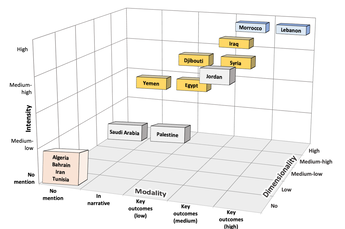
To empirically investigate these links and their policy ramifications, I have constructed a global database of 500+ UN Development Assistance Frameworks (UNDAFs, now called Sustainable Development Cooperation Frameworks) and 300+ national development plans that are coded according to the framework domains. In addition, I constructed the Index on Mobility Inclusion (IMI) that measures the intensity, modality and dimensionality of how human mobility concerns are reflected in planning documents. My research at the intersection of global governance, international organization, development studies and human mobility research sheds light on the processes, policy learning mechanisms and multi-level politics that are involved in integrating human mobility concerns in global, regional and national development plans.
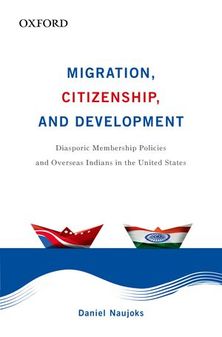
Migration, Citizenship and Development
My book “Migration, Citizenship and Development—Diasporic Membership Policies and Overseas Indians in the United States” (2013, Oxford University Press) deals with India’s policies to engage with its diaspora population and the effects of such policies on social and economic development. It analyzes and categorizes different policy and regulatory activities by various Indian state actors, their content, the involved communication dimension and their repercussions.
At the level of effects, the book theorizes the individual level and group level determinants, as well as the concrete consequences of remittances, investment, philanthropy, and return migration. To this end, it explores the effect of citizenship and legal privileges on economic actions, naturalization behavior, social identity, and diasporic good will. The book is based on qualitative field research with diasporic Indians in the U.S. as well as returnees in India, following a Grounded Theory approach in tradition of Corbin and Strauss. An OLS regression analysis of American Community Survey data completes the picture by exploring the link between naturalization and income levels among ethnic Indians in the U.S.
This research aims at filling several critical gaps. While it is often claimed that dual citizenship may play a beneficial role for their country of origin’s development and that it may strengthen ties between migrants and their countries of origin there appear to be no empirical studies on the effects of dual citizenship, let alone on India’s special membership statuses. In addition, the book contains an extensive and innovative analysis of U.S. naturalization data in order to assess the naturalization-increasing effect of dual citizenship in the country of residence. These innovative ways of calculating and comparing naturalization data will generate better and more meaningful analysis and evaluation of citizenship policies while quantitative researchers are reminded that we need to contextualize the naturalization decision, considering factors in the country of origin, destination, as well as in the migrant community alike.
The book showcases my beliefs that the most meaningful research includes normative ideas and concepts from political theory and public policy, elements of policy learning and diffusion of knowledge, the political process and struggle of interests and power, the implementation and significance of such policies at the individual and group level. For the latter, I sympathize with sociological and ethnographic methods of capturing every-day processes of policy implementation and the meaning of such measures. Too often social science theories and frameworks depart from stylized ideas of ‘rational’ behavior of citizens that is—too often—not empirically grounded in realities.
For more information on the book, see www.migration-citizenship-development.com
My book “Migration, Citizenship and Development—Diasporic Membership Policies and Overseas Indians in the United States” (2013, Oxford University Press) deals with India’s policies to engage with its diaspora population and the effects of such policies on social and economic development. It analyzes and categorizes different policy and regulatory activities by various Indian state actors, their content, the involved communication dimension and their repercussions.
At the level of effects, the book theorizes the individual level and group level determinants, as well as the concrete consequences of remittances, investment, philanthropy, and return migration. To this end, it explores the effect of citizenship and legal privileges on economic actions, naturalization behavior, social identity, and diasporic good will. The book is based on qualitative field research with diasporic Indians in the U.S. as well as returnees in India, following a Grounded Theory approach in tradition of Corbin and Strauss. An OLS regression analysis of American Community Survey data completes the picture by exploring the link between naturalization and income levels among ethnic Indians in the U.S.
This research aims at filling several critical gaps. While it is often claimed that dual citizenship may play a beneficial role for their country of origin’s development and that it may strengthen ties between migrants and their countries of origin there appear to be no empirical studies on the effects of dual citizenship, let alone on India’s special membership statuses. In addition, the book contains an extensive and innovative analysis of U.S. naturalization data in order to assess the naturalization-increasing effect of dual citizenship in the country of residence. These innovative ways of calculating and comparing naturalization data will generate better and more meaningful analysis and evaluation of citizenship policies while quantitative researchers are reminded that we need to contextualize the naturalization decision, considering factors in the country of origin, destination, as well as in the migrant community alike.
The book showcases my beliefs that the most meaningful research includes normative ideas and concepts from political theory and public policy, elements of policy learning and diffusion of knowledge, the political process and struggle of interests and power, the implementation and significance of such policies at the individual and group level. For the latter, I sympathize with sociological and ethnographic methods of capturing every-day processes of policy implementation and the meaning of such measures. Too often social science theories and frameworks depart from stylized ideas of ‘rational’ behavior of citizens that is—too often—not empirically grounded in realities.
For more information on the book, see www.migration-citizenship-development.com

Diaspora investment
Foreign investments made by migrants and diaspora actors may indeed increase capital and technology in the source countries, create employment, add to foreign exchange earnings, and contribute to economic growth and poverty reduction. Although our actual knowledge about the extent, determinants and impacts of such flows is scarce diaspora investments are seen as an untapped source of capital.
One key area of my research activities relates to understanding the determinants and impacts of diaspora investments, as well as the policies governing them. I have recently proposed a multi-disciplinary research agenda on diaspora investments and analyzed the paradigms, policies and patterns of Indian Diaspora Investments in the Routledge Handbook of the Indian Diaspora.
In 2015-2016, I served as the principal investigator for a research project, funded by the Swiss government and UNDP, on the impact of diaspora investments on economic development. In addition to a global mapping of such practices, in cooperation with Mohamed Kriaa from the University of Tunis, I conducted a survey of 400 randomly-chosen firms in Tunisia that allowed us to compare the impact of foreign direct investments by ethnic Tunisians and other investors on employment, wages, rural development, and exports. While an increasing number of governments are creating special incentives for diaspora investments, this is the first study to systematically assess their impact.
Foreign investments made by migrants and diaspora actors may indeed increase capital and technology in the source countries, create employment, add to foreign exchange earnings, and contribute to economic growth and poverty reduction. Although our actual knowledge about the extent, determinants and impacts of such flows is scarce diaspora investments are seen as an untapped source of capital.
One key area of my research activities relates to understanding the determinants and impacts of diaspora investments, as well as the policies governing them. I have recently proposed a multi-disciplinary research agenda on diaspora investments and analyzed the paradigms, policies and patterns of Indian Diaspora Investments in the Routledge Handbook of the Indian Diaspora.
In 2015-2016, I served as the principal investigator for a research project, funded by the Swiss government and UNDP, on the impact of diaspora investments on economic development. In addition to a global mapping of such practices, in cooperation with Mohamed Kriaa from the University of Tunis, I conducted a survey of 400 randomly-chosen firms in Tunisia that allowed us to compare the impact of foreign direct investments by ethnic Tunisians and other investors on employment, wages, rural development, and exports. While an increasing number of governments are creating special incentives for diaspora investments, this is the first study to systematically assess their impact.
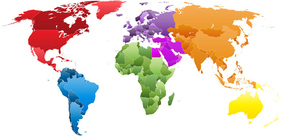
Immigration Policies in the Global South — Towards a Global Immigration Theory
Developing countries host 41 percent of all international migrants in the world. However, migration scholarship has focused largely on analysis of migration patterns, policies, and outcomes in the Northern America, Europe, and Australia. Immigration policies and flows in the Global South are often strongly influenced by the former colonial powers from which immigration laws are inherited. Several developing countries are opposed to ratifying the 1951 Refugee Convention and its 1967 protocol. In a book project I am analysing the key elements of migration policies in key African, Asian and Latin American countries, the aspirations of the polities to (re)consider immigration, as well as the migration outcomes such policies generate. This includes an analysis of the narratives about immigration and ethnicity that are prevalent in the societal, policy, and media discourse.
Developing countries host 41 percent of all international migrants in the world. However, migration scholarship has focused largely on analysis of migration patterns, policies, and outcomes in the Northern America, Europe, and Australia. Immigration policies and flows in the Global South are often strongly influenced by the former colonial powers from which immigration laws are inherited. Several developing countries are opposed to ratifying the 1951 Refugee Convention and its 1967 protocol. In a book project I am analysing the key elements of migration policies in key African, Asian and Latin American countries, the aspirations of the polities to (re)consider immigration, as well as the migration outcomes such policies generate. This includes an analysis of the narratives about immigration and ethnicity that are prevalent in the societal, policy, and media discourse.
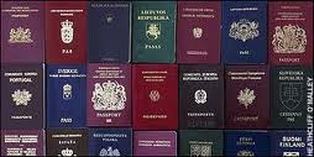
Defining the boundaries of citizenship: Global Constructions of Citizenship, Atypical citizenship and the Meaning of Membership
I aim to understand the way states construct citizenship, both internally and externally, both at present and also considering the historical development of narratives, norms, and notions. With several partner institutions, I am engaged in establishing a global, multi-lingual database of citizenship legislation that will contribute to the development of meaningful citizenship indicators at the global level. My personal research interest tries to dismantle the monolithic idea about what ‘citizenship’ means —even in legal terms— and to enable meaningful comparative research to link the provision of rights and freedoms to political, social, and developmental outcomes.
My comparative research on citizenship includes analyses of atypical forms of citizenship that deviate from classic notions. In a recent essay, titled Atypical citizenship regimes: Comparing legal and political conceptualizations, I draw on the experiences of the Overseas Citizenship of India, the British Overseas Citizenship, and European Citizenship to show that citizenship concepts can serve as valuable political tools in the process of inclusion and exclusion, and hence political, social and ethnic boundary making.
Relating to discussions in democracy and citizenship theory, as well as transnational studies, cosmopolitism and discourse analysis, the chapter analyzes the aspirations of political actors, the political rhetoric and the differences between tangible privileges and discursive elements of the three different citizenship policies. It highlights differences in the constructions of ‘special subjects’, moral obligations and the exercise of power and contributes toward understanding modern conceptualizations of citizenship.
I aim to understand the way states construct citizenship, both internally and externally, both at present and also considering the historical development of narratives, norms, and notions. With several partner institutions, I am engaged in establishing a global, multi-lingual database of citizenship legislation that will contribute to the development of meaningful citizenship indicators at the global level. My personal research interest tries to dismantle the monolithic idea about what ‘citizenship’ means —even in legal terms— and to enable meaningful comparative research to link the provision of rights and freedoms to political, social, and developmental outcomes.
My comparative research on citizenship includes analyses of atypical forms of citizenship that deviate from classic notions. In a recent essay, titled Atypical citizenship regimes: Comparing legal and political conceptualizations, I draw on the experiences of the Overseas Citizenship of India, the British Overseas Citizenship, and European Citizenship to show that citizenship concepts can serve as valuable political tools in the process of inclusion and exclusion, and hence political, social and ethnic boundary making.
Relating to discussions in democracy and citizenship theory, as well as transnational studies, cosmopolitism and discourse analysis, the chapter analyzes the aspirations of political actors, the political rhetoric and the differences between tangible privileges and discursive elements of the three different citizenship policies. It highlights differences in the constructions of ‘special subjects’, moral obligations and the exercise of power and contributes toward understanding modern conceptualizations of citizenship.
Publications
Book
2013. “Migration, Citizenship, and Development. Diasporic Membership Policies and Overseas Indians in the United States” New Delhi: Oxford University Press. Web link (Oxford) ; Web link: www.migration-citizenship-development.com
Peer-reviewed journal articles
Naujoks. Daniel. 2022. “Multilateral Approaches to Mobility in the Middle East and North Africa Region.” International Development Policy 14 | 2022, DOI: https://doi.org/10.4000/poldev.4795.Naujoks.
Naujoks. Daniel. 2022. “A transnational research agenda on the determinants, policies, and impacts of diaspora direct investments.” Research in Globalization 4.
Naujoks. Daniel. 2021. “Refugee Camps and Refugee Rights: A simulation of the response to large refugee influxes.” Journal of Political Science Education. DOI: 10.1080/15512169.2018.1559066.
Naujoks. Daniel. 2020. “From Passport to Pennies: Exploring the effects of dual citizenship on migrants' remittances.” Remittance Review 5 (1): 55-82. DOI:10.33182/rr.v5i1.899.
Naujoks. Daniel. 2020. “Atypical citizenship regimes: Comparing legal and political conceptualizations.” Comparative Migration Studies 8 (1), DOI: 10.1186/s40878-019-0156-0.
Naujoks. Daniel. 2015. "The securitization of dual citizenship. National security concerns and the making of the Overseas Citizenship of India." Diaspora Studies 8 (1), pp. 18–36. Web link
Naujoks. Daniel. 2010. “Diasporic Identity. Reflections on Transnational Belonging.” Diaspora Studies 3 (1), pp. 1–21. Web link and for a previous version of the paper.
Naujoks. Daniel. 2008. “Macht und Identität. Eine Diskursanalyse zur doppelten Staatsbürgerschaft.” Zeitschrift für Politik 55 (4), pp. 387–412. Web link
Book Chapters and Working Papers
Naujoks. Daniel. 2023. “International Treaties, Conventions, and Laws on Forcible Displacement.” In: Nancy Murakami and Mashura Akilova (eds.) Integrative Social Work Practice with Refugees, Asylum Seekers, and Forcibly Displaced Persons, Springer, pp. 45-67.
Naujoks. Daniel. 2022. “Trends, Drivers and Dynamics of Flight and Migration.” In Hans-Joachim Preuß, Dirk Messner, and Christoph Beier (eds), Forced Displacement and Migration. Approaches and Programmes of International Cooperation, Wiesbaden: Springer, pp. 19-40.
Naujoks. Daniel. 2020. “Multilateralism for Mobility: Interagency Cooperation in a Post-pandemic World.” In: Ibrahim Sirkeci and Jeffrey H. Cohen (eds.), Human Mobility and Pandemic: Understanding the Pandemic and Human Mobility: London: Transnational Press, pp. 183-193. Preprint
Naujoks. Daniel. 2020. “Diaspora Policies, Consular Services and Social Protection for Indian Citizens Abroad,” in Jean-Michel Lafleur and Daniela Vintila (eds), Migration and Social Protection in Europe and beyond: a focus on non-EU Sending States, Springer Open Access, IMISCOE Research Series, pp. 163-181.
Naujoks. Daniel. 2020. “Flucht und Migration: Trends, Faktoren, Dynamik.” In Dirk Messner, Christoph Beier, and Hans-Joachim Preuß (eds), Globale Wanderungsbewegungen. Wiesbaden: Springer VS.
(forthcoming, 2020). “Diaspora Policies and Social Protection in India” in Jean-Michel Lafleur and Daniela Vintila (eds), Migration and social protection in Europe and beyond: a focus on non-EU sending states (Volume 3), Springer Open Access, IMISCOE Research Series.
Naujoks. Daniel. 2018. “Paradigms, Policies and Patterns of Indian Diaspora Investments”, in Radha S. Hegde and Ajaya K. Sahoo (eds), Routledge Handbook of the Indian Diaspora, Milton Park and New York: Routledge, pp. 90-103. Web link
Naujoks. Daniel. 2017. "The Transnational Political Effects of Diasporic Citizenship in Countries of Destination: Overseas Citizenship of India and Political Participation in the United States", in David Carment and Ariane Sadjed (eds), Diaspora as Cultures of Cooperation Global and Local Perspectives, Springer, pp. 199-221. Web link
Naujoks. Daniel. 2016. Assessing the Impact of Diaspora Investments in Tunisia. United Nations Development Programme and International Organization for Migration (with Mohamed Kriaa).
Naujoks. Daniel. 2012. “Does Dual Citizenship Increase Naturalization? – Evidence from Indian Immigrants in the U.S.” Research Paper 125, Hamburg Institute of International Economics. Web link
Naujoks. Daniel. 2010. “India and its Diaspora. Changing Research and Policy Paradigms”, in: Dietrich Thränhardt and Michael Bommes (eds.). National Paradigms of Migration Research. Göttingen: V&R Unipress, pp. 269-300. Web link for a previous version of the paper.
Naujoks. Daniel. 2009. “Emigration, Immigration, and Diaspora Relations in India”. Migration Policy Institute, Washington, DC. Web link
Naujoks. Daniel. 2009. “Dual citizenship. The discourse on ethnic and political boundary-making in Germany” Focus Migration Policy Brief, Migration in Europa e.V. and the German Agency for Civic Education. Web link
(For the German language version "Die doppelte Staatsbürgerschaft. Der Diskurs um ethnische und politische Grenzziehung in Deutschland", see Web link)
Naujoks. Daniel. 2004. “Turning Brain Drain into Brain Circulation – Can Dual Nationality be a key factor?”, IILS Background Paper. Geneva: International Institute for Labour Studies, International Labour Organization.
Other publications
Naujoks. Daniel. 2020. “Engaging diaspora direct investors: The four elements of successful policy regimes” Columbia FDI Perspectives.
Naujoks. Daniel. 2020. Beyond COVID-19: Refugees and the value of life paradox. Medium.
Naujoks. Daniel. 2019. Book review of “Indian Migration and Empire: A Colonial Genealogy of the Modern State” by Radhika Mongia in Journal of South Asian History and Culture, DOI: 10.1080/19472498.2019.1694625.
Naujoks. Daniel. 2018. Disappearing Islands: What Happens To Their Nations and People? (with Riad Meddeb), Medium, accessible at: https://medium.com/@riad.meddeb/disappearing-islands-what-happens-to-their-nations-and-people-f318c374188.
Naujoks. Daniel. 2018. “Achieving the Migration-Related Sustainable Development Goals.” In: United Nations and International Organization for Migration, 2017 Situation Report on International Migration. Migration in the Arab Region and the 2030 Agenda for Sustainable Development, Beirut: UN Economic and Social Commission for Western Asia, pp. 73-122.
Naujoks. Daniel. 2017. “Teaching migration and citizenship studies – a comparative analysis of 100 interdisciplinary syllabi”, Migration and Citizenship. Newsletter of the American Political Science Association Organized Section on Migration and Citizenship 6 (1): 66-73 (with Kelsey Norman).
Naujoks. Daniel. 2017. Book review of 'At Home in Two Countries: The Past and Future of Dual Citizenship by Peter J. Spiro. Ithaca, NY. 2016' in Political Science Quarterly 132 (2), 391-393.
Naujoks. Daniel. 2016. "Migration, Human Mobility and Sustainable Development", MUNPlanet, https://www.munplanet.com/articles/fridays-with-munplanet/migration-human-mobility-and-sustainable-development.
Naujoks. Daniel. 2006. “Wenn Staaten lernen lernen – der hochrangige Dialog über internationale Migration und Entwicklung”, Informationsdienst Bevölkerung & Entwicklung, Nr. 61, November 2006, pp. 4–5, German Society for the United Nations.
Naujoks. Daniel. 2006. “Die verschiedenen Dimensionen illegaler Einwanderung–Von der Legalisierung lateinamerikanischer Migranten in Spanien” Eine-Welt-Presse 1-23/2006, p. 7, German Society for the United Nations.
Naujoks. Daniel. 2006. “Der Rechtsanwalt als Sanitäter – eine Einführung in die Erste Hilfe des Rechts”, Berliner Anwaltsblatt 2006, pp. 62–3.
Naujoks. Daniel. 2005. “Illegale Einwanderung–Spanien legalisiert Illegal-Beschäftigte”, Der Schlepper 31/2005, p. 25.
United Nations Reports
OECD Development Centre, UNDP and KNOMAD. 2020. Measuring Policy and Institutional Coherence for Migration and Development—A dashboard of indicators. Washington DC: KNOMAD (lead co-author).
Global Migration Group (GMG). 2017. Integrating migration and displacement into UN Development Assistance Frameworks (UNDAFs), Guidance Note (lead author). Web link
United Nations Development Programme (UNDP). 2017. "Municipalities and People on the Move: Cities’ Development Policies for Successful Local Management of Migration and Displacement." UNDP Guidance Note, New York: UNDP (lead author). Web link
United Nations Development Programme (UNDP). 2015. “A development approach to migration and displacement." UNDP Guidance Note, New York: UNDP (lead author). Web link.
Naujoks, Daniel. 2014. Mainstreaming Migration into Development Strategies in Bosnia & Herzegovina: Key Concepts and International Experiences. Sarajevo: United Nations Development Programme.
Joint Migration and Development Initiative (JMDI). 2012. “Mapping local authorities’ practices in the area of migration and development: a territorial approach to local strategies, initiatives and needs” (lead author) Web link.
United Nations. 2012. “Report of the UN Secretary-General on Adolescents and Youth” (contributing author) .
Book
2013. “Migration, Citizenship, and Development. Diasporic Membership Policies and Overseas Indians in the United States” New Delhi: Oxford University Press. Web link (Oxford) ; Web link: www.migration-citizenship-development.com
Peer-reviewed journal articles
Naujoks. Daniel. 2022. “Multilateral Approaches to Mobility in the Middle East and North Africa Region.” International Development Policy 14 | 2022, DOI: https://doi.org/10.4000/poldev.4795.Naujoks.
Naujoks. Daniel. 2022. “A transnational research agenda on the determinants, policies, and impacts of diaspora direct investments.” Research in Globalization 4.
Naujoks. Daniel. 2021. “Refugee Camps and Refugee Rights: A simulation of the response to large refugee influxes.” Journal of Political Science Education. DOI: 10.1080/15512169.2018.1559066.
Naujoks. Daniel. 2020. “From Passport to Pennies: Exploring the effects of dual citizenship on migrants' remittances.” Remittance Review 5 (1): 55-82. DOI:10.33182/rr.v5i1.899.
Naujoks. Daniel. 2020. “Atypical citizenship regimes: Comparing legal and political conceptualizations.” Comparative Migration Studies 8 (1), DOI: 10.1186/s40878-019-0156-0.
Naujoks. Daniel. 2015. "The securitization of dual citizenship. National security concerns and the making of the Overseas Citizenship of India." Diaspora Studies 8 (1), pp. 18–36. Web link
Naujoks. Daniel. 2010. “Diasporic Identity. Reflections on Transnational Belonging.” Diaspora Studies 3 (1), pp. 1–21. Web link and for a previous version of the paper.
Naujoks. Daniel. 2008. “Macht und Identität. Eine Diskursanalyse zur doppelten Staatsbürgerschaft.” Zeitschrift für Politik 55 (4), pp. 387–412. Web link
Book Chapters and Working Papers
Naujoks. Daniel. 2023. “International Treaties, Conventions, and Laws on Forcible Displacement.” In: Nancy Murakami and Mashura Akilova (eds.) Integrative Social Work Practice with Refugees, Asylum Seekers, and Forcibly Displaced Persons, Springer, pp. 45-67.
Naujoks. Daniel. 2022. “Trends, Drivers and Dynamics of Flight and Migration.” In Hans-Joachim Preuß, Dirk Messner, and Christoph Beier (eds), Forced Displacement and Migration. Approaches and Programmes of International Cooperation, Wiesbaden: Springer, pp. 19-40.
Naujoks. Daniel. 2020. “Multilateralism for Mobility: Interagency Cooperation in a Post-pandemic World.” In: Ibrahim Sirkeci and Jeffrey H. Cohen (eds.), Human Mobility and Pandemic: Understanding the Pandemic and Human Mobility: London: Transnational Press, pp. 183-193. Preprint
Naujoks. Daniel. 2020. “Diaspora Policies, Consular Services and Social Protection for Indian Citizens Abroad,” in Jean-Michel Lafleur and Daniela Vintila (eds), Migration and Social Protection in Europe and beyond: a focus on non-EU Sending States, Springer Open Access, IMISCOE Research Series, pp. 163-181.
Naujoks. Daniel. 2020. “Flucht und Migration: Trends, Faktoren, Dynamik.” In Dirk Messner, Christoph Beier, and Hans-Joachim Preuß (eds), Globale Wanderungsbewegungen. Wiesbaden: Springer VS.
(forthcoming, 2020). “Diaspora Policies and Social Protection in India” in Jean-Michel Lafleur and Daniela Vintila (eds), Migration and social protection in Europe and beyond: a focus on non-EU sending states (Volume 3), Springer Open Access, IMISCOE Research Series.
Naujoks. Daniel. 2018. “Paradigms, Policies and Patterns of Indian Diaspora Investments”, in Radha S. Hegde and Ajaya K. Sahoo (eds), Routledge Handbook of the Indian Diaspora, Milton Park and New York: Routledge, pp. 90-103. Web link
Naujoks. Daniel. 2017. "The Transnational Political Effects of Diasporic Citizenship in Countries of Destination: Overseas Citizenship of India and Political Participation in the United States", in David Carment and Ariane Sadjed (eds), Diaspora as Cultures of Cooperation Global and Local Perspectives, Springer, pp. 199-221. Web link
Naujoks. Daniel. 2016. Assessing the Impact of Diaspora Investments in Tunisia. United Nations Development Programme and International Organization for Migration (with Mohamed Kriaa).
Naujoks. Daniel. 2012. “Does Dual Citizenship Increase Naturalization? – Evidence from Indian Immigrants in the U.S.” Research Paper 125, Hamburg Institute of International Economics. Web link
Naujoks. Daniel. 2010. “India and its Diaspora. Changing Research and Policy Paradigms”, in: Dietrich Thränhardt and Michael Bommes (eds.). National Paradigms of Migration Research. Göttingen: V&R Unipress, pp. 269-300. Web link for a previous version of the paper.
Naujoks. Daniel. 2009. “Emigration, Immigration, and Diaspora Relations in India”. Migration Policy Institute, Washington, DC. Web link
Naujoks. Daniel. 2009. “Dual citizenship. The discourse on ethnic and political boundary-making in Germany” Focus Migration Policy Brief, Migration in Europa e.V. and the German Agency for Civic Education. Web link
(For the German language version "Die doppelte Staatsbürgerschaft. Der Diskurs um ethnische und politische Grenzziehung in Deutschland", see Web link)
Naujoks. Daniel. 2004. “Turning Brain Drain into Brain Circulation – Can Dual Nationality be a key factor?”, IILS Background Paper. Geneva: International Institute for Labour Studies, International Labour Organization.
Other publications
Naujoks. Daniel. 2020. “Engaging diaspora direct investors: The four elements of successful policy regimes” Columbia FDI Perspectives.
Naujoks. Daniel. 2020. Beyond COVID-19: Refugees and the value of life paradox. Medium.
Naujoks. Daniel. 2019. Book review of “Indian Migration and Empire: A Colonial Genealogy of the Modern State” by Radhika Mongia in Journal of South Asian History and Culture, DOI: 10.1080/19472498.2019.1694625.
Naujoks. Daniel. 2018. Disappearing Islands: What Happens To Their Nations and People? (with Riad Meddeb), Medium, accessible at: https://medium.com/@riad.meddeb/disappearing-islands-what-happens-to-their-nations-and-people-f318c374188.
Naujoks. Daniel. 2018. “Achieving the Migration-Related Sustainable Development Goals.” In: United Nations and International Organization for Migration, 2017 Situation Report on International Migration. Migration in the Arab Region and the 2030 Agenda for Sustainable Development, Beirut: UN Economic and Social Commission for Western Asia, pp. 73-122.
Naujoks. Daniel. 2017. “Teaching migration and citizenship studies – a comparative analysis of 100 interdisciplinary syllabi”, Migration and Citizenship. Newsletter of the American Political Science Association Organized Section on Migration and Citizenship 6 (1): 66-73 (with Kelsey Norman).
Naujoks. Daniel. 2017. Book review of 'At Home in Two Countries: The Past and Future of Dual Citizenship by Peter J. Spiro. Ithaca, NY. 2016' in Political Science Quarterly 132 (2), 391-393.
Naujoks. Daniel. 2016. "Migration, Human Mobility and Sustainable Development", MUNPlanet, https://www.munplanet.com/articles/fridays-with-munplanet/migration-human-mobility-and-sustainable-development.
Naujoks. Daniel. 2006. “Wenn Staaten lernen lernen – der hochrangige Dialog über internationale Migration und Entwicklung”, Informationsdienst Bevölkerung & Entwicklung, Nr. 61, November 2006, pp. 4–5, German Society for the United Nations.
Naujoks. Daniel. 2006. “Die verschiedenen Dimensionen illegaler Einwanderung–Von der Legalisierung lateinamerikanischer Migranten in Spanien” Eine-Welt-Presse 1-23/2006, p. 7, German Society for the United Nations.
Naujoks. Daniel. 2006. “Der Rechtsanwalt als Sanitäter – eine Einführung in die Erste Hilfe des Rechts”, Berliner Anwaltsblatt 2006, pp. 62–3.
Naujoks. Daniel. 2005. “Illegale Einwanderung–Spanien legalisiert Illegal-Beschäftigte”, Der Schlepper 31/2005, p. 25.
United Nations Reports
OECD Development Centre, UNDP and KNOMAD. 2020. Measuring Policy and Institutional Coherence for Migration and Development—A dashboard of indicators. Washington DC: KNOMAD (lead co-author).
Global Migration Group (GMG). 2017. Integrating migration and displacement into UN Development Assistance Frameworks (UNDAFs), Guidance Note (lead author). Web link
United Nations Development Programme (UNDP). 2017. "Municipalities and People on the Move: Cities’ Development Policies for Successful Local Management of Migration and Displacement." UNDP Guidance Note, New York: UNDP (lead author). Web link
United Nations Development Programme (UNDP). 2015. “A development approach to migration and displacement." UNDP Guidance Note, New York: UNDP (lead author). Web link.
Naujoks, Daniel. 2014. Mainstreaming Migration into Development Strategies in Bosnia & Herzegovina: Key Concepts and International Experiences. Sarajevo: United Nations Development Programme.
Joint Migration and Development Initiative (JMDI). 2012. “Mapping local authorities’ practices in the area of migration and development: a territorial approach to local strategies, initiatives and needs” (lead author) Web link.
United Nations. 2012. “Report of the UN Secretary-General on Adolescents and Youth” (contributing author) .
